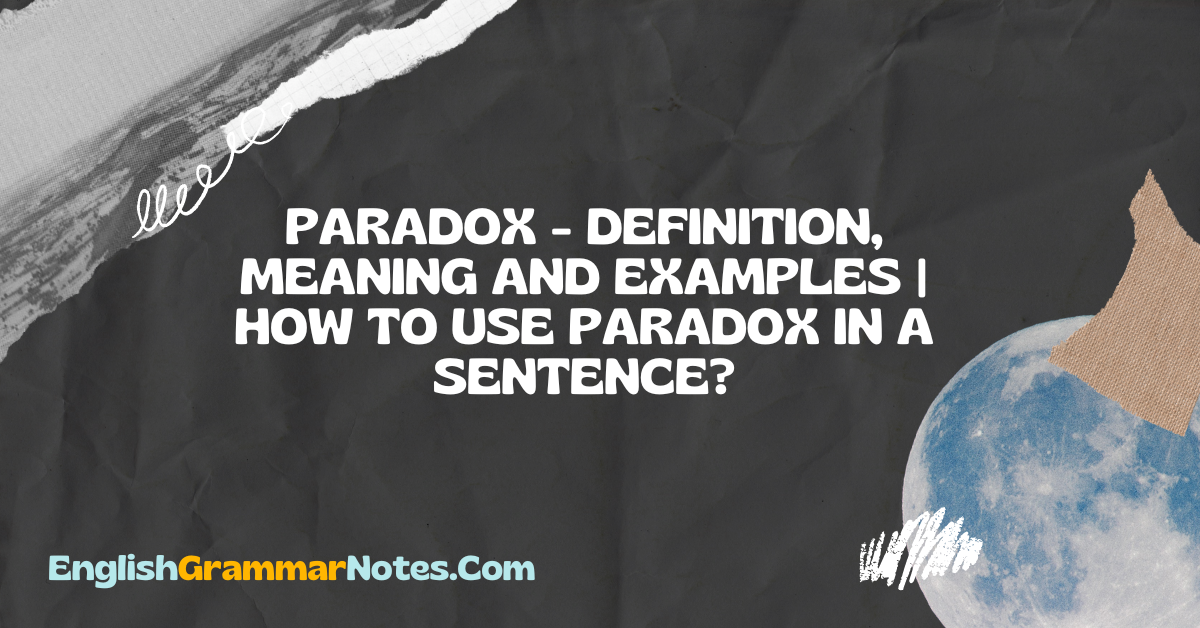Are you familiar with what a paradox is? If not, you are at the right place. A paradox is a figure of speech used not just in literature, but in everyday interactions as well. In this article, we have put together all the essential information about paradox including its definition, common examples, its significance, etc.
- What is a Paradox?
- Paradox Examples
- Famous Examples of Paradox in Literature
- Paradox Vs Oxymoron
- Paradox Vs Antithesis
- Difference between Logical Paradox and Literary Paradox
- Why Use Paradox?
- What is a paradox?
- Give examples of Paradoxes?
- Distinguish between Paradox and Oxymoron?
- Distinguish between literary and logical paradox?
What is a Paradox?
The word “paradox” has its roots in the Greek word “paradoxes,” which means contrary to what is expected. A paradox is a statement that appears to be contradictory but can be true. For example, take this famous dialogue from Oscar Wilde’s Lady Windermere’s Fan,
“I can resist everything, except temptation”
Here the author uses contradicting ideas to exemplify the character’s inability to withstand temptation.
Paradox Examples
As mentioned above, paradox comes in handy even in everyday conversations. Have a look at some of the common paradoxical statements:
- The more you lend, the more you attain
- You can save money by spending it
- If I am sure about one thing, its that I am sure I know nothing
- Earn money by spending it
- The beginning is the ending
- I am a truthful liar
Famous Examples of Paradox in Literature
A paradox is most effective in literature. Examples of paradoxes can be found in poetry, prose, etc. Have a look at some of these:
- “I know one thing, that I know nothing” (Socrates, according to Plato)
- “I’m My Own Grandpa” (lyrics by Ray Stevens)
- “I’m Nobody! Who are you? / Are you – Nobody – too?” (Emily Dickinson)
Check out more about Literary Devices from here and study about them to know how useful they can be in improving your English.
Paradox Vs Oxymoron
You might often mistake an oxymoron with a paradox. Both of these are used in Literature and everyday conversation. However, there exists a distinction between them:
- A paradox is inherently true even though the statement or sentences appear to be contradictory
- On the other hand, an oxymoron consists of two contradictory words. Examples of oxymorons include bittersweet, terrible beauty, etc.
Paradox Vs Antithesis
As with oxymoron and paradox, antithesis and paradox are similar devices. However, they have different functions. An antithesis engages in the juxtaposition of two different ideas. However, unlike a paradox, which focuses on self-contradiction, antithesis focuses on the opposition of opposite ideas.

Difference between Logical Paradox and Literary Paradox
Based on whether a paradox can be resolved or not, there exist two kinds:
Logical Paradox: A logical paradox defies logic and as a result, cannot be resolved.
Literary Paradox: A literary paradox can be resolved to get a deeper meaning.
Why Use Paradox?
The use of paradox can be beneficial to you in several ways:
- The use of paradox elicits humor
- Helps in building suspense in a story
- Paradox helps in the creation of irony
- Paradise helps to highlight an idea
- Paradox helps you to think critically.
- Illustrates the important themes in a work
Read More:
FAQs on Paradox
The paradox is a figure of speech commonly used in literature and everyday interactions. A paradox is a statement that appears to be contradictory but can be true.
2. Give examples of Paradoxes?
Some common examples of paradoxes include: Earn money by spending it, The beginning is the ending, I am a truthful liar, etc.
3. Distinguish between Paradox and Oxymoron?
A paradox is true even though the statement or sentences appear to be contradictory. On the other hand, an oxymoron consists of two contradictory words.
4. Distinguish between literary and logical paradox?
A logical paradox defies logic and as a result, cannot be resolved. On the other hand, A literary paradox can be resolved to get a deeper meaning.
Conclusion
Paradoxes have great significance in literature as well as in everyday conversation. The use of a single paradoxical statement can help you convey the most important idea most effectively. However when you compose a paradox be sure that it stays true even though it appears to be self-contradictory.
